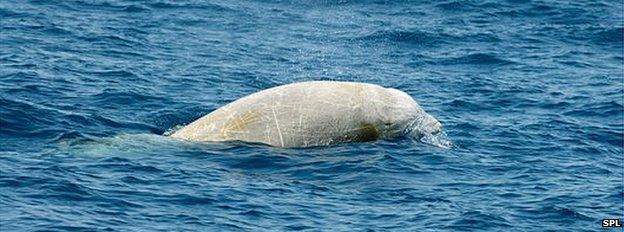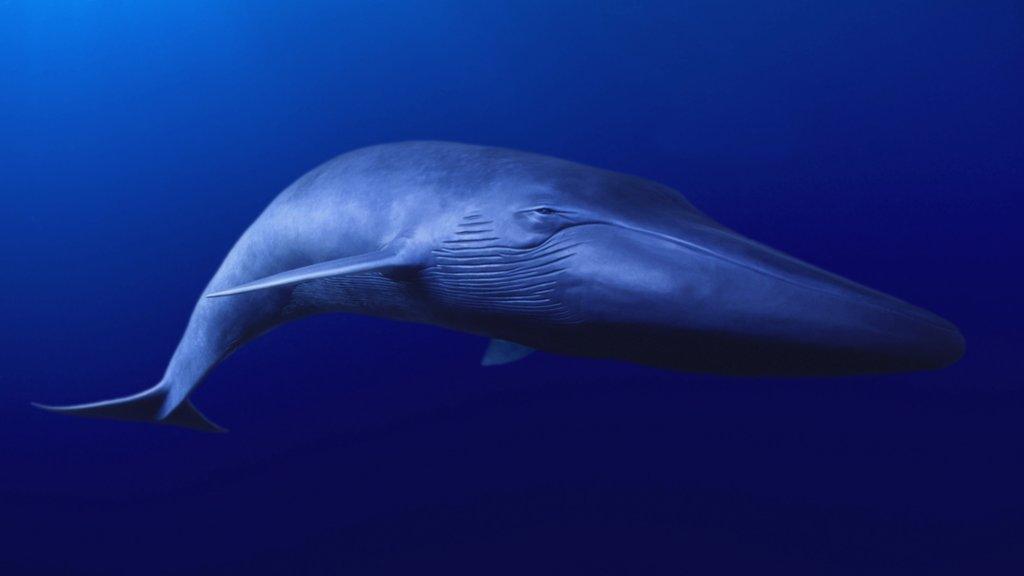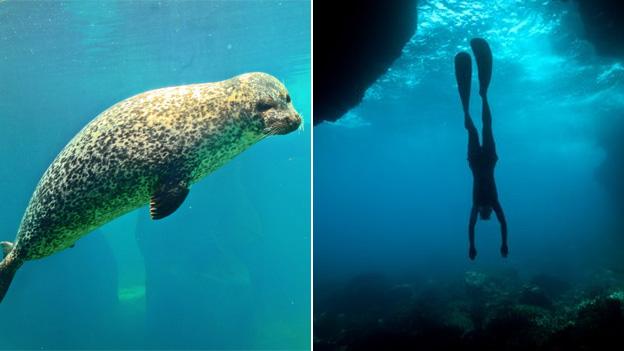Beaked whale is deep-dive champion
- Published

The elusive creatures are very difficult to study
Cuvier's beaked whales are likely to be the most extreme breath-holders among marine mammals.
Satellite tags attached to these animals, swimming off the coast of California, recorded a dive to nearly 3km below the ocean surface, and one that lasted 137 minutes.
This performance exceeds that for any southern elephant seal, which is also known to be an extreme breath-holder.
The Cuvier's record-breaking dives are reported in the journal Plos One, external.
Erin Falcone is a research biologist with the Cascadia Research Collective, external in Washington State, US, which led the research project.
She told BBC News that beaked whales had very high levels of the myoglobin protein in their muscles, to the point where the tissues appeared almost black.
This functions like haemoglobin in the blood, allowing the whales to store much higher levels of oxygen, and thus breathe less frequently while remaining active.
Dr Michael Berenbrink from the University of Liverpool explains how marine mammals are able to hold their breath for so long.
"One key adaptation that seems to allow beaked whales to dive more deeply than other species is a dramatic reduction in air spaces within their bodies," she added.
"It is the presence of air spaces within the body that would crush a human at a fraction of the depths these whales can dive.
"Reduction in air spaces not only makes them more 'crush resistant', but also likely serves to reduce the uptake of dissolved gases into their tissues - which can lead to decompression sickness or 'the bends'."
Sizeable ability
Cuvier's beaked whales have long been recognised as expert divers, but their precise abilities have been uncertain because of the paucity of data detailing their behaviour in the wild.
The Cascadia group and colleagues managed to put tags on eight animals, collecting over 3,700 hours of diving data.
This information covered more than 1,000 individual deep-dives, averaging depths of 1,400m; and some 5,600 shallow dives, averaging about 275m down.
The prevalent behaviour, says the team, is for a single deep foraging dive followed by a series of shallow dives. The time spent at the surface between each dive can be very short - just a few minutes.
The deepest recorded dive was to 2,992m; the longest lasting was 137.5 minutes. These numbers beat the current mammalian dive record, which was claimed for southern elephant seals at a depth of 2,388m and a duration of 120 minutes.
Dr Paul Jepson from the Zoological Society of London was not connected with the study. He told BBC News: "This paper is incredible for how deep and long these relatively small cetacean species can dive. As a general rule, dive depth and duration tend to scale with body size and body mass - but Cuvier's (adults around 2,500kg) are much smaller than other deep-diving species like sperm whales (up to 57,000kg).
"Of course, what we really need is more tags on more animals. But people who study Cuvier's will tell you these animals are incredibly shy and it's very difficult to get near them to attach a tag."
Sonar concerns
One interesting aspect of the study was its location - within the Southern California Anti-Submarine Warfare Range.
This is surprising because Cuvier's beaked whales are thought to be particularly susceptible to the disturbance caused by military sonar. Many strandings of the species have been reported coincident with military exercises.
The fact that the study animals persisted inside the range hints that they may have become habituated to sonar. But Erin Falcone urged some caution on this interpretation.
"The area where we conducted our study is one of the most heavily used sonar training areas in the world, and when we began working there we were shocked to find as many Cuvier's beaked whales as we did, given that they seem so sensitive to this type of disturbance elsewhere.
"We are actively working to identify periods of time when the whales we tagged were likely exposed to sonar (which has been no small challenge) to see how their behaviour changed, since it is hard to imagine that they are not affected in some way, and understanding how they alter their behaviour here might help to protect beaked whales elsewhere."
Jonathan.Amos-INTERNET@bbc.co.uk and follow me on Twitter: @BBCAmos, external
- Published3 July 2013

- Published17 June 2013
